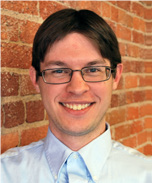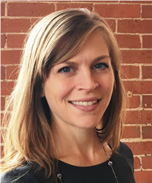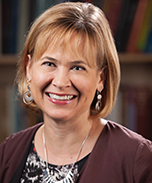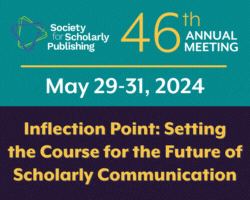Nicola Poser of the SSP Marketing and Communications Committee sat down with 2018 Annual Meeting Program Committee co-chairs Cason Lynley (Duke University Press), Ben Mudrak (Research Square), and Laura Ricci (EBSCO Information Services). The SSP 40th Annual Meeting will be held May 30-June 1, 2018, in Chicago, IL. Registration is open at https://bit.ly/2HWqEWi.”
Please tell us a bit about your previous involvement with SSP and the Annual Meeting – have you served on other committees, have you served on this committee in the past, etc.
 Ben – I was invited to speak on a panel at the 2012 annual meeting, and I got hooked on SSP from there. I joined the Annual Meeting Program Committee in 2013, and this is my second year as a co-chair. It’s been such a pleasure working with a committee full of dedicated people.
Ben – I was invited to speak on a panel at the 2012 annual meeting, and I got hooked on SSP from there. I joined the Annual Meeting Program Committee in 2013, and this is my second year as a co-chair. It’s been such a pleasure working with a committee full of dedicated people.
 Laura – My first exposure to the SSP Annual Meeting was as a speaker on a pre-meeting seminar — little did I know I would be on the committee a few years later! This is my third and final year as co-chair, but I’m looking forward to staying involved in SSP as a new Board Member at Large and by attending regional events in Boston.
Laura – My first exposure to the SSP Annual Meeting was as a speaker on a pre-meeting seminar — little did I know I would be on the committee a few years later! This is my third and final year as co-chair, but I’m looking forward to staying involved in SSP as a new Board Member at Large and by attending regional events in Boston.
 Cason – I have served on the program committee off and on since at least 2010 and have presented at several sessions. I also served on the education committee for a couple of years before returning to the program committee—I couldn’t stay away. This is my first year as annual program committee co-chair and I have really enjoyed it.
Cason – I have served on the program committee off and on since at least 2010 and have presented at several sessions. I also served on the education committee for a couple of years before returning to the program committee—I couldn’t stay away. This is my first year as annual program committee co-chair and I have really enjoyed it.
What do you value about participation in SSP and, in particular, attending the Annual Meeting?
SSP is an organization full of talented and motivated individuals, and the SSP Annual Meeting is one of those rare opportunities to step outside our own specific roles and think about how we all fit into the bigger picture of scholarly communications. As attendees, we have seen how the content of the annual meeting can challenge us — in really good ways — and as co-chairs, we have tried to facilitate the creation of a program that will do so again this year. The meeting examines issues in scholarly publishing that may not directly affect our organizations at the moment or in the same way, but that will impact us down the road. It’s exciting to hear what other key stakeholders in scholarly communication are doing and how they are meeting the ever-changing environment of scholarly publishing. Both the annual meeting and participation in SSP in general are also excellent opportunities to learn about new technology or developments in existing technology and to make new connections, networking with attendees ranging from publishers, librarians, and researchers.
What were some surprises or particular challenges in planning this year’s Annual Meeting?
Planning the 40th Anniversary meeting was an exciting challenge, not only because there are so many new, hot topics to cover in the program, but also because we wanted to capture the spirit of how far the industry has come in 40 years since the first Annual Meeting. We think the committee did a great job striking a balance with some really future-forward, practical content and a few sessions that take a more introspective look at our industry and “why we do what we do.” In our experience, the best surprises are those that happen at the meeting itself – we look forward to the stories afterwards about people making serendipitous professional connections, and learning something unexpected and new!
What are you most looking forward to at this year’s Annual Meeting?
The breadth of the program means a lot to look forward to! This year’s keynote speakers will challenge us to think about how the way we share information we share can affect social change and how publishing can apply long-standing principles to build a better future for scholarly communication. The program will feature a few important looks at diversity and inclusion, and how SSP and the industry as a whole can continue to improve in those areas. Add that to a new and improved “Previews” session, where the audience will vote on their favorite new innovation, and the 40th anniversary gala, and you’ve got a great lineup!
We’re also looking forward to learning more about topics that were proposed by some forward-thinkers in the SSP community. We had a few proposals, like those focusing on AI, where the topic felt almost futuristic at first. Now it’s the focus of so many questions; we think it couldn’t be timelier!
The Annual Meeting is always evolving. This year, in particular, includes a very diverse set of Pre-Meeting Seminars. Can you tell us a bit about what participants can expect from these seminars?
Pre-meeting seminars offer a unique chance to dive into an important topic with several other industry colleagues. These three-hour seminars feature greater interactivity and more participant-driven activity, giving attendees a chance to take home new knowledge or plans that relate directly to their most pressing concerns. This year, our committee has pulled together a slate that will cover business models for open-source players in the industry, best practices for a large platform migration, and ways to apply machine learning and data mining to real-world publishing problems. We’re also following up on one of last year’s most successful seminars with a “part 2” of managing difficult editorial situations at journals. Together, there’s a topic that everyone will find useful.
Any sneak previews you can give us of the big party celebrating SSP 40?
The task force organizing the SSP 40th Anniversary Celebration has done a great job pulling together a “red letter” event on Navy Pier — from what we hear, they’ve really pulled out all of the stops! That probably explains why registration for this year’s meeting has been at record levels. Anyone who has enjoyed the networking at previous SSP events should make extra sure to pack some red attire and set their flight to arrive on time for Wednesday’s reception (We hear it will be a “blast”!)
Anything else you would like to add?
It’s been a great pleasure having three co-chairs for this committee and so many dedicated committee volunteers. We have a lot to do every year with the responsibilities divided up across the program and the seminars. We have been able to support each other and divide the work to make sure everything gets done. It’s also been useful for bouncing ideas off of each other. It takes a whole team to make the meeting happen, and we can’t wait to see the results of everybody’s hard work!



Join the Conversation
You must be logged in to post a comment.